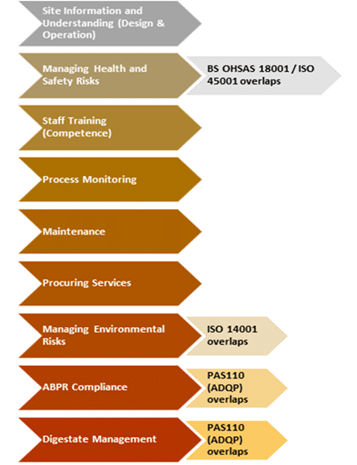The launch of the government’s BIOMASS STRATEGY presents some certainty and a set of clear…
ADCS and ISO accreditation. What role do they play and how do they differ?
When considering standards for AD operations there are two key recognized options that a site could be accredited to: The International Organization of Standardization (ISO) (45001, 9001 and 14001) and the Anaerobic Digestion Certification Scheme (ADCS).
But how do they differ?
ISO 45001, for Occupational Health and Safety (OH+S), 14001, for Environmental Management Systems (EMS), and 9001 for Quality management Systems (QMS) are international standards that prescribe a framework by which organizations can manager their OH+S, EMS, and management systems, respectively. These standards are designed to apply to any type of organization, in any industry, in any country in the world and therefore simply set a framework of the factors that need to be considered for a company to effectively manage OH+S risk or have an EMS. Due to the broad application of the standard, it cannot determine any specific measures, regulations or laws that must be met but instead checks that an organization has a process is in place whereby they can manage OH+S, EMS and QMS. This process includes having a leadership commitment, managing people and resources, and then measuring and evaluating performance.
In contrast to this, the ADCS was developed in the UK by key stakeholders exclusively for the UK AD sector. There are some small areas of overlap between the ISO standards and the ADCS criteria but almost all the ADCS criteria are not covered by the ISO Standards and audits. There are some criteria in the ADCS that are deemed to have been met if a valid ISO certificate can be shown; this will reduce the auditing requirement. For example, some health and safety procedures and emergency response planning are considered to be met if ISO 45001 has been achieved and Environmental Management Systems (EMS) requirements are met if ISO 14001 has been achieved. Where ISO complements the ADCS it can help streamline the accreditation process and auditing requirements while still checking standards in other areas which aren’t covered by ISOs.
The ADCS is the only standard specifically for the AD sector that sets out to promote and recognize operational excellence in the UK. It does this by assessing and supporting plants to achieve best practice, improved operational performance and compliance with H+S and environmental regulations. Whereas an ISO audit will check that a process or framework is in place the ADCS will check specific procedures, documents and knowledge is present for that site to display best practice and compliance. In the event of a non-compliance the auditor will support and guide the site to make the improvement and meet the criteria. As a result, the ADCS is not simply a standard that is either met or not met but rather a tool that sites can use to improve their performance and compliance and provide valuable external verification.

ADCS case study
David McKee, Chief Technical Officer of Granville Eco Park AD Facility in Dungannon, Northern Ireland, a Chartered Chemical Engineer with over 15 years’ experience in the renewable energy industry.
“I have been involved in the Granville Ecopark project from its conception, the whole way through the build, commissioning and now oversight of successful operations. Creating the business from design to implementation has given me invaluable insight to the AD industry.
A part of Granville Eco Park’s culture and success has been due to working within very high industry standards, this was complimented by achieving the first ADCS certification in the UK, a reflection of our hard work and dedication to our staff, our investors, the plant & the environment. The Anaerobic Digestion Certification scheme has been implemented to be an industry led standard which is there to improve and protect the health and safety, the people and the environment within the biogas industry. Governance and compliance play a vital role in maintaining key commercial and operational objectives, and there is a need to promote high levels of accountability within the industry. As environmental and sustainable executives, we have a moral obligation to ensure that our people and plant are safe, our inputs and products are of the highest possible standards, and that all our actions protect the local and national environment.
Taking all of this into account, there are some out there still asking themselves why they should become part of the ADCS, however in retort, the question actually should be, how could they not want to become part of it, as it is exactly the standard we all should be striving for.”
If you are interested in the ADCS then you can visit the scheme website https://www.adcertificationscheme.co.uk/ and download the scheme criteria.
You can also contact Josh Henthorne, Technical Support Manager at ADBA.



